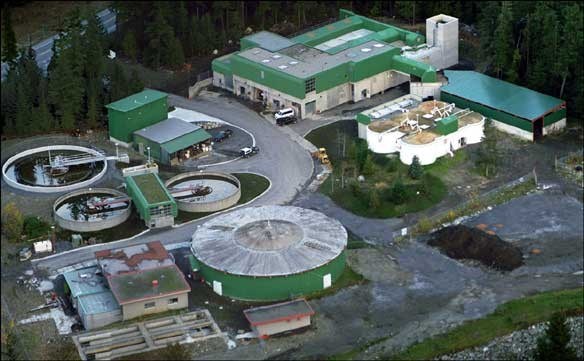Whistler voters can have a say in the future of the proposed public/private partnership, which is supposed to deliver multi-million dollar upgrades to the sewage treatment plant.
On Monday night council voted, in a 5 to 2 decision, to move ahead with an Alternative Approval Process (AAP). That means if 10 per cent of the voters in Whistler, which the municipality pinpoints at 892 people, acquire the correct form from municipal hall and submit it by the June 12 deadline the project will either go to referendum or back to the drawing board.
If less than 10 per cent of voters register their concern council can move ahead with the P3 contract, which would see a private operator undertake the two-year upgrades to Whistler’s overtaxed and smelly sewage plant and operate it for 10 years.
Council is required under the Community Charter to hold either an AAP or a referendum because the contract, which will contain capital liabilities on the part of the municipality, is longer than five years. Council chose the AAP.
"It’s council’s hope that by using this test (instead of the referendum) it not only saves money but it also could accelerate the process," explained Mayor Ken Melamed.
A referendum would cost $35,000 and take 90 days, as opposed to the $1,000 AAP.
Time is an important factor, as construction costs are rising so quickly the budget for the work has jumped from $22.3 million last year to $34.4 million this year.
In the AAP, voters can fill out a form at municipal hall or take a copy from the municipal web site, www.whistler.ca , and drop it off before the June 12 deadline.
This is the latest step in the controversial P3 decision that began with the last council.
Several community members, some holding placards saying "Keep it Public", were in the audience to hear council’s decision Monday night. Among them were representatives from the Council of Canadians and the local chapter of the Canadian Union of Public Employees – two groups against the P3.
Two councillors voted against the AAP decision. Nancy Wilhelm-Morden, who has spoken out against the P3 on several occasions, wanted to go straight to a referendum, forgoing the AAP altogether.
"I don’t think it’s fair, I don’t think it’s democratic and I don’t think it’s accountable," she said of the proposed AAP process.
There was loud clapping from the audience as soon as she stated her position. Mayor Ken Melamed quickly chastised the audience for the outburst, asking them to remain respectful in council chambers.
"The council chambers is a place where people should feel safe and part of making it safe is that the mayor needs to maintain decorum," he said the following day.
"Once you’re allowing people to clap then you’re (giving) tacit approval for hissing and booing. It’s just better to have clean respectful chambers where everyone can feel safe to speak."
Wilhelm-Morden had several reasons for opposing the AAP. She questioned the accuracy of the 892 voters needed, calling the voters list "completely outdated."
November’s election marked one of the biggest turnouts in recent memory in which almost 3,800 people voted, she said. By the municipality’s count more than 5,000 people didn’t vote, but Wilhelm-Morden didn’t buy that.
Staff, however, stuck by their number, explaining how they arrived at the total number of voters as 8,920.
Corporate Officer Shannon Story admitted it was not an exact science but said she felt strongly it was a fair and conservative number to move forward with.
In addition to questioning this number Wilhelm-Morden also felt there was important information missing. Voters reading the summary would get the benefits without learning about the potential risks, she said.
"It seems to me it’s a biased summary," she said.
She also called the AAP process "onerous."
The three companies bidding on the P3 will not submit their proposals until after the AAP is complete.
When the mayor asked how council could amend the process to get her on board, she said she would like to see the proposals from the three companies interested in the P3 and then send the question immediately to a referendum.
Councillor Eckhard Zeidler agreed with Wilhelm-Morden’s position.
Every month the costs for the project climb. They have gone up more than 50 per cent in the last 12 months.
An AAP takes 30 days. A referendum, on the other hand, would take several months to prepare.
Councillor Ralph Forsyth said council needs to get the project rolling and the AAP is the cheapest, fastest and most effective way to poll community support.
Admittedly the P3 project is a complicated issue, with proponents and opponents entrenched.
There have been questions raised whether or not privatizing the sewage operations will lead to a privatization of Whistler’s drinking water.
"They’re completely different," said the mayor. "I think everyone on council fundamentally understands there’s a difference between water delivery and sewage."
In the weeks to come the municipality will conduct a public education program to inform the community on all sides of the issues.
Mayor Melamed reiterated to one concerned community member at council meeting: "We’re not trying to hide from the debate."




